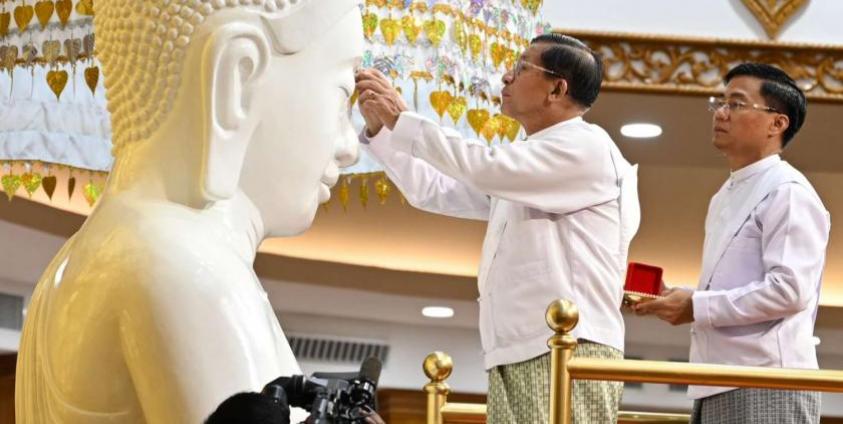Charging an entrance fee to visit the Maravijaya Buddha Image in Nay Pyi Taw, which was built under the leadership of junta leader Senior General Min Aung Hlaing, has sparked criticism for being seen as using the Buddha's image for commercial purposes.
With the goal of providing a peaceful experience for visitors from all over the country to the Maravijaya Buddha Image, the Military Council has announced that starting from August 20, an entrance fee will be implemented. This fee will support the necessary repair and maintenance work to ensure the sustainability of both the Buddha image and the park.
The announcement states that individuals visiting the Buddha image constructed by the junta leader will incur the following charges: 1,000 kyats for adults and children, 10 US dollars for foreigners, 5,000 kyats for capturing photos with a smartphone camera, 50,000 kyats for the use of professional cameras, 20,000 kyats for vehicles, and 10,000 kyats for a one-hour buggy ride.
Regarding the Military Council's announcement of implementing entrance fees for public access to the Buddha image, a citizen told Than Lwin Times that it appeared akin to commercializing the use of the Buddha image.
"As business dwindles, it seems they resort to exploiting the Buddha image for financial gain. This goes against the sacred purpose of the Buddha image. If its creation was meant to cultivate spiritual merit, then access should be granted freely. But now, it appears the Buddha image is being commercialized. While I hold a desire to visit multiple pagodas, the Buddha image's significance has waned in my priorities. A visit could quickly deplete my funds," a resident shared.
In Myanmar, the democratic system, which played a crucial role in lifting the country out of poverty while military generals ruled by relying on weapons and manipulation for decades, had to be halted due to the coup.
In addition, the socio-economic regression following the coup has remained unreversed. The continuous rise, without any decline, of commodity prices such as gold and foreign exchange has created a dire situation for the grassroots people.
He also remarked that the junta leader's exploitation of the Buddha image for profit during a time when the people are facing severe hardships is tarnishing the sanctity of the religion and is not acceptable to the populace.
"When people are facing difficulties, does it mean that those who lack financial resources are denied access to the Buddha image? If a person is financially challenged, are they excluded from entering the Buddha's premises? The right to freely visit the Buddha should extend to everyone. That's our perspective. Moreover, this Buddha image wasn't solely funded by his wealth; it was built by his cronies group. However, exploiting the Buddha's image for financial gain tarnishes the sanctity of the religion. It's something that cannot be accepted as a people," he stated.
Moreover, he pointed out that charging a fee to visit the Buddha image is a practice that should be avoided. He highlighted that Myanmar stands alone in the world in adopting this approach, and he expressed his belief that such actions are inappropriate and should not be pursued.
On August 1, the consecration ceremony of the Maravijaya Buddha Image included the hoisting of golden umbrellas atop small pagodas on 1440 stone plaques inscribed in Pali-Burmese-Roman trilingual. The event also invited 900 monks from both local and foreign regions, and the Military Council organized a grand ceremony to mark the occasion.
Following this, the period was extended to enable people from both nearby and distant locations to visit the Buddha image constructed by the junta leader without any charges. State-owned newspapers with military propaganda featured extensive coverage, highlighting the notable presence of pilgrims from different regions.







